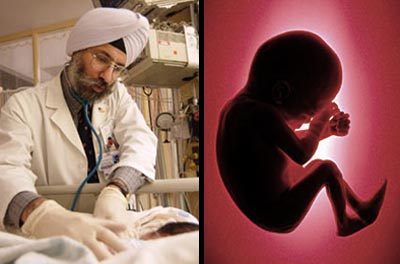Science/Tech
Sunny Anand and the Hidden Pain of the Unborn

Annie Murphy Paul’s “The First Ache,” which appeared in last Sunday’s New York Times Magazine, is the perfect companion piece to Austen Ivereigh’s “A Question of Empathy.” Both articles show how science is changing the terms of the abortion debate by “personifying” the unborn. In Paul’s fascinating article, she zeros in on the question: When does a human being begin to feel pain in the womb?
I was shocked to learn from the article that until recently doctors believed that infants couldn’t feel pain because their nervous systems were too immature. Doctors routinely operated on them without anesthesia.
Dr. Kanwaljeet “Sunny” Anand, the hero of the article, changed all that. The Oxford- and Harvard-trained neonatal pediatrician, like Galileo first observing Jupiter’s moons, was the first to recognize that infants, even preterm babies, feel pain.
Twenty five years ago, according to the article, when Anand was a medical resident in a neonatal ICU, he noticed that babies returning from surgery were often “in terrible shape: their skin gray, their breathing shallow, their pulses weak.” When Anand learned the infants weren’t receiving anesthesia, he suspected that might be the problem. He began a series of clinical trials. They showed that pain relief given to newborns during operations reduced their stress reactions (considered an indicator of pain) and increased their survival rates. Anand’s work “helped changed the way medicine is practiced,” writes Paul. Denying pain relief to a newborn “would now be considered a violation of medical ethics.”
Anand eventually began asking whether fetuses feel pain in the womb, a question that became more relevant with the advent of fetal surgery. That’s where the article shifts into its subtheme: abortion.
Although Anend’s “not a stereotypical Bible-thumping pro-lifer,” and he’s not against all abortions, he’s been a key witness for Senator Sam Brownback’s fetal pain legislation, currently stalled in the Senate. The bill mandates pain relief for a fetus in abortions of 20 weeks or later—the point beyond which Anand believes that an unborn child feels “excruciating” pain. (The supreme court has upheld fetal pain laws that are on the books in several states). But the implications of Anand’s work go beyond pain relief for the unborn.
“Over the past four years” Paul writes, “anti-abortion activists have turned fetal pain into a new front in their battle to restrict or ban abortion.”
With the abortion stakes so high—and the article appearing in the pro-choice New York Times—at this point I wondered where Paul was taking the essay. Was she setting Anand up for a fall? Would she bring in evidence to debunk fetal pain?
I remembered last year’s NY Times Magazine hatchet job on “post-abortion syndrome.” It concluded that the condition was imagined, an atonement narrative for depressed women with “perfect imagined babies waiting in heaven.”
But Paul didn’t do that. She plays it straight and objective, probing the question from every angle, connecting the issue of fetal pain and its relationship to the human brain to a wide-range of human concerns, too many to mention here (She’s writing a book on “the lasting effects of early experience”).
She touches on the same themes Ivereigh writes about, explaining how “anti-abortion forces” (no concession on terminology) “draw on a deep tradition” when they use pain to prove the humanity of outsiders. She quotes the monologue of Shylock, the Jew, in The Merchant of Venice: “if you prick us, do we not bleed?”—and other examples.
Unfortunately, she presents an oversimplified view of history. Only recently, she says, has the “charmed circle” of those considered human expanded to include the outcast, forgetting that it was Christianity —“There is neither Jew nor Greek, there is neither slave nor free person, there is not male and female; for you are all one in Christ Jesus. (Gal 3:28)”—that first recognized the humanity of every person (including infants and the unborn), despite the periodic backsliding of Christians since.
But the focus of the debate is on hard science, and she brings in doctors and scientists from both sides.
Mark Rosen, a renowned anesthesiologist, questions whether fetal reactions in the womb—both physical and hormonal—actually translate into subjective feelings of pain, because the brain of a fetus is undeveloped. Bjorn Merker, a Swedish neuroscientist, counters with the almost miraculous example of children who are mentally functional despite being born without a cerebral cortex, a condition known as hydranencephaly. The implications for science are revolutionary—where does consciousness reside if not in the cerebral cortex? According to Paul, this raises important questions, not only about fetal pain, but about the treatment of people considered “brain dead” (like Terry Schiavo).
The debate is clinched for the pro-life side by the self-evidently false statements of the “provocateur” Stuart Derbyshire, a British psychologist who claims that “even birth may not inaugurate the ability to feel pain.” Here we’re in Peter Singer territory—the Princeton philosopher who claims that animals deserve more rights than infants—having left common sense moral reasoning far behind. Derbyshire lamely admits that a fetus is biologically human: “it isn’t a cow. But,” he adds, “it’s not yet psychologically human.” That status, he says, is “not bestowed at conception but earned with each connection made and word spoken.”
After crossing the line that marks the sanctity of life, Paul allows Derbyshire, “following this logic to its conclusion,” to hang himself by making the absurd claim that “babies cannot feel pain until they are 1 year old.”
But Rosen’s final comments are even more damning, and Paul does everyone a favor by letting him have his say. Responding to Sam Brownback’s statement that it’s contradictory to give a fetus anesthetic during surgery but not during an abortion, Rosen euphemistically replies that it’s not a contradiction, but “only a necessary complexity…
“When he was in medical school, he says, he worked for a time at an abortion clinic in the morning and a fertility clinic in the afternoon — an experience that showed him ‘the amazing incongruities of life.’ In the three decades since then, he says he has come to believe that ‘there’s a time for fetal anesthesia, and maybe there’s a time not.’”
Rosen sounds like God. He gives life, and he takes it away.
When someone says there’s a time to let live, and a time to kill, the question becomes: Who decides? Rosen? And when, according to Derbyshire’s model of human development, does a human being “earn” his or her right to life? When Derbyshire decides?
Pro-lifers used to be accused of denying what’s human because they care about life that is mostly invisible. But now that science has opened a window onto the womb, it’s the “choice” side who seems increasingly inhuman.
Early in the article, Paul tries to hide behind ambiguity: “the truth about fetal pain can seem as murky as an image on an ultrasound screen, a glimpse of a creature at once recognizably human and uncomfortably strange.” Fortunately, her reporting belies her uncertainty. What comes through—whether she consciously intended it or not (what is consciousness, she might ask?)—is truth. A complex truth best expressed in her own paraphrasing of Anand:
“The fetus is not a little adult,’ and we shouldn’t expect it to look or act like one. Rather, it’s a singular being with a life of the senses that is different, but no less real, than our own.”
By AT 06.02.11 10:33AM Not Rated
The rut how you conscientious to talk about some posts at here seems to me different. There are unquestionably other posts at here, but i didn’t bargain measure post related to projects like pass4sure 642-741. if someone have information about it,do tell me!Well any updates related to this post. if yes than do tell me!actually i came here while surfing net to get data related to projects of pass4sure 1z0-051 and find this post different one. Is there anyone having information about pass4sure 642-973. if yes than do tell me!By the way what is your opinion about insurance AND interest. is it ethical, i don’t think so!









By star AT 05.24.09 03:03AM Not Rated
It never was men’s prerogative to give or take the life of an unborn child. For me, it’s cowardice to do such a thing to a defenseless human being inside a mother’s womb! God gives life and only Him decides when He takes it away. Let each one of us adopt spiritually an unborn child who is vulnerable / in danger of abortion and continually pray for that child. God bless the unborn cute lovely babies !